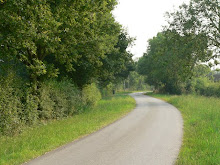Last night I was awakened at 2AM. Sleep was impossible for about two hours afterwards. Was it my racing brain, too much rare meat or coffee? No. It was the owl party that had started. I'm not talking about one owl. I'm talking about the whole owl neighbourhood.
One of the beauties of living at Laytham is the presence of owls. The barn owls are practically a logo of the place, so often are they seen. People think that barn owls are nocturnal. But not entirely. I often see them well before dusk, and occasionally some time after dawn. As the season gets colder, they hunt earlier. They are silent, relentless and ruthless hunters. Their pattern is to quarter fields and run down the lines of dikes, lanes and hedges. When they find prey they will hover a bit above it, then swoop down, and it's theirs. They normally eat away from the site of the kill. So sometimes you can see them flying with their prey in their talons. More than once I have been cycling or in the car with a barn owl flying along the line of the lane, keeping pace, totally unbothered by my presence. There are few more majestic sights than a barn owl in frosty or misty weather. Owls are nearly blind. They don't see well in the conventional sense at all. What they do extraordinarily well is hear. An owl, I'm told, can hear a shrew move in the grass a kilometer away, zero in on it, swoop and kill.
The largely undisturbed habitat around Laytham is home to at least three species of owl. The barn owl is one. The Little Owl is another. These, sadly, you mostly come across dead. They have an unfortunate habit of resting, or maybe even roosting, in the middle of the tarmac of a road. Then they get run over.
Last night's party was the tawny owls. One calls too-whit. Another calls too-woo. Or more accurately hoo-ha-ha-hooo. This call is often mistaken for the barn owl. But in fact, the barn owl rarely calls. When it does, it's a harsh screech. last night I guess about ten or maybe more birds were communicating. I could guess crude locations for each, based on the cry.Their calls are often described as ghostly or mournful. But I find them amorous, romantic, wistful and lovely. I've never heard as many calling as last night. What were they saying? Only when I rot will I stand a chance of speaking owl, alas.
But I wonder if they had been troubled by the great silver bird that had landed in their territory earlier in the day. Perhaps they were awake enough to see it. Matt and I did. It was circling the village in the early afternoon, uncertainly, evidently conning to find a suitable place to land and circling lower and lower. Then it made a very low circuit, at only a couple of hundred feet before skimming the ash trees on Tanner Lane and disappearing. Fearing for the safety of the glider pilot, Matt and I raced out to check everything was ok. The glider had come down in the huge field behind my meadow, landing on the stubble. The two pilots had got out and were completely unphased. Stubble fields are apparently the landing strip of choice as you can see what you are landing on. Grass is not so good as you can't predict how long it is. One of the pilots recounted to us an occasion where he had landed in a field of grass that was higher than the canopy of the glider. A weird and scary experience, he said.
"How will you get the glider out now?" I asked.
"Simple," said the pilot. "We'll call up the glider tug. The plane will come in and land, then give us a tow and we'll take off again."
A ripple of excitement ran through the village at the arrival of these unexpected guests. So maybe that was also the cause of all the owl commotion.
Sunday, 30 August 2009
Subscribe to:
Post Comments (Atom)

















No comments:
Post a Comment